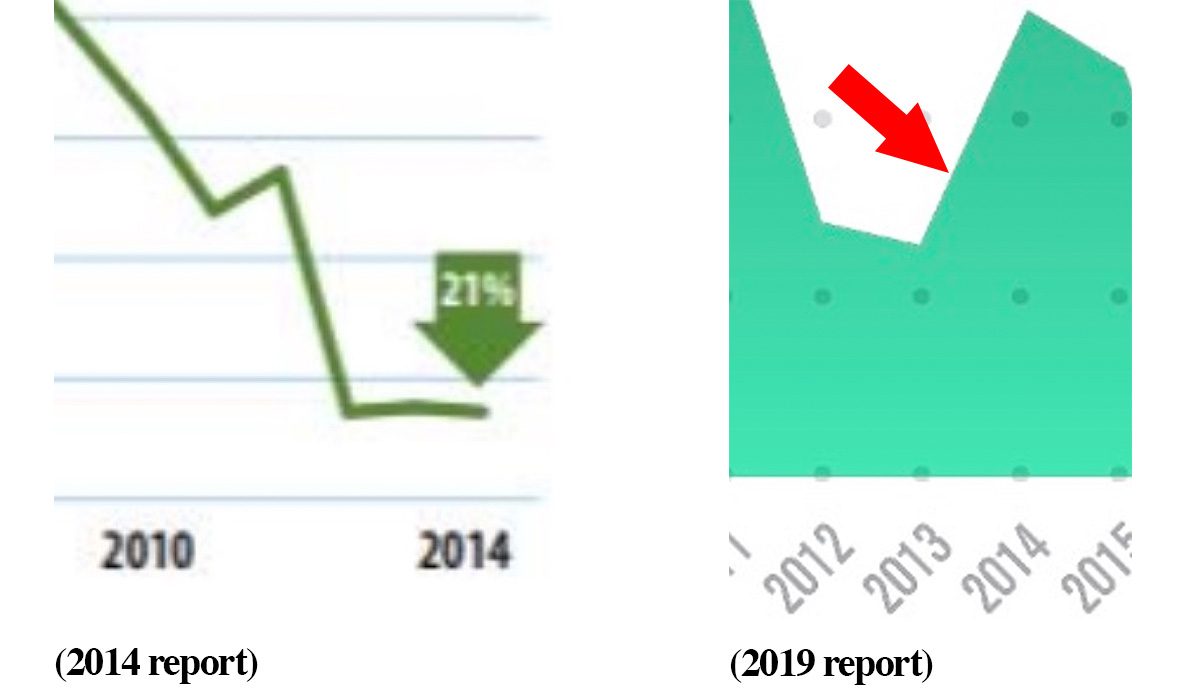
Yesterday Portland released an update on local carbon emissions. The results are troubling. With demonstrations planned tomorrow as part of the Global Climate Strike, I anticipate City Hall will put out a statement supporting the event and use the occasion to reaffirm Portland’s “commitment to climate change”.
But just how committed are we? I’d say not very if you look at how little priority we’ve given to tracking our progress thus far.
In 1993, Portland was the first city in the US to create a climate action plan, yet we still don’t consistently report our results. This lack of basic accounting allows government agencies to control the progress narrative and doesn’t allow for the honest reckoning this issue demands.
This lapse in basic accountability begs us to ask whether the city’s Bureau of Planning & Sustainability (BPS, who compiles the report) or the Mayor who oversees them, is either not competent enough to monitor the biggest crisis of our generation, is trying to spin the truth, or simply doesn’t care enough to prioritize it.
Out of 171 action items currently tracked by the 2015 Climate Action Plan, publishing an annual report is the second to last. The report published yesterday (PDF), which didn’t include updates on any of those 171 actions, comes two-and-a-half years after the last report. There was no mention of the delay. In fact, the report plainly states that Portland monitors and reports data annually.
This past July, when Portland Mayor Ted Wheeler testified in Washington D.C. before the Democrat’s Special Committee on the Climate Crisis, the report was officially seventeen months late. This lapse in basic accountability begs us to ask whether the city’s Bureau of Planning & Sustainability (BPS, who compiles the report) or the Mayor who oversees them, is either not competent enough to monitor the biggest crisis of our generation, is trying to spin the truth, or simply doesn’t care enough to prioritize it.
Why does consistent and up-to-date progress tracking matter?

The 2017 report showed a steep decline in Portland’s total emissions, 21% down from 1990 levels in 2014. 2014 was the year of the infamous Ice Bucket Challenge; before the Columbia River Gorge caught fire and before the IPCC Report was released. It was also the last year that Oregon’s emissions declined, thanks to a still rising increase in transportation emissions.
Advertisement
Newer data, reported by BPS this summer and published yesterday, showed that 2014 was in fact not down but up, both per person and in total, reversing several years of decline. There is still no mention of this dramatic shift, one that rightly would have changed our narratives around our progress on climate action the last several years. We are still left to wonder whether this change is because of new accounting methods, or a more troubling inconsistency with the 2014 data, as it was the only year that seemed to change.
The bureau claimed via Twitter that “This is very good.” But to me the last five years look like the flattening out at the bottom of a ski slope, sputtering to a stop.
How we communicate when we fail to meet our goals and how quickly we can course correct will define our success — or failure.
If Portland had continued its steady decline as it had from 2000 to 2013 we would have reduced emissions by roughly 30% by 2017, doubly as far along as the 15% plateau we’re on now. Every year we stay at this level puts us in greater jeopardy that we won’t be able to meet the 40% reduction goal by 2030.
With an aim to get us there, one of the demands of the local chapter of the Sunrise Movement, a spirited new organization that has made their presence felt at meetings for Metro’s 2020 Transportation Bond and staged a sit-in at Mayor Wheeler’s office, is to declare a climate emergency. It seems we’re finally getting around to that. Making declarations is one of the things we do best.
We made another declaration in June 2017 when Portland and Multnomah County passed a resolution to convert all energy, including transportation, to renewables by 2050. The Oregonian reported the hearing as “…largely a congratulatory session, with plenty of tweaks to the language, but little dissension or discussion of the technical challenges ahead.”
I personally found the resolution so lacking in teeth that it was the first time I used a vacation day to testify at city hall.
From the perspective of our elected leaders, it’s easy to see why they felt so confident. Just a few months earlier (in April), Portland was reportedly on track to meet its emissions reductions goals. Except, it wasn’t true then. And it’s not true now.
To tell the truth about the state of affairs means admitting that we’re failing to meet our goals. It is to say that our current systems of politics and power have not shown themselves to be capable of managing this crisis. There is no sugar-coating it, plunging our emissions downward will require vigilant and aggressive action. It will be hard.
How we communicate when we fail to meet our goals and how quickly we can course correct will define our success — or failure — over the next decade.
In 1993 Portland was leading the way on climate action. Now we’re are at a turning point and at risk of becoming an example of what not to do. It’s time to stop the back-patting and speak honestly about the scale of the task at hand. If we can get control of emissions and turn these lines in the right direction, Portland could once again be a model for cities worldwide.
— Catie Gould, @Citizen_Cate on Twitter
Never miss a story. Sign-up for the daily BP Headlines email.
BikePortland needs your support.

